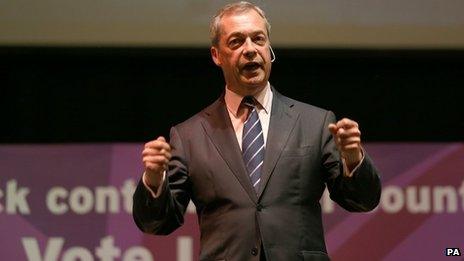Why Farage not standing in by-election matters
- Published

Doing nothing is sometimes the right thing to do. It can be a core principle of diplomacy, and is often so for our Foreign and Commonwealth Office.
The received wisdom at Westminster is that Nigel Farage's decision not to stand in the Newark by-election is the right thing to do. The risk is too great; the Conservative majority too high.
Why bet the house when UKIP is likely to do very well, thank you, at the European elections next month? It isn't a suitable seat; Mr Farage is not local. And so on.
But politics is not just about strategy and psephology. It is also about mood, tone and impression. "Man not standing" may not be the sexiest headline but it does not mean there are no consequences.
1. Mr Farage likes to talk of revolutions and earthquakes. Well, those are phenomena that change the rules and defeat the received wisdom.
Mr Farage has chosen not to stand in a by-election where the ousted MP is disgraced, where the post-European election momentum would be with UKIP, where the party's most popular and visible candidate would be standing and where the full resources of the party would be available for the fight.
Mr Farage may possibly be strategically right not to stand but in so doing he has admitted that UKIP has its limits. That unlike that fizzy yellow lager, there are parts of the country that he cannot reach. In other words, the UKIP revolution has suddenly got a little Fabian and gradual.
2. This will provide a morale boost to the Conservatives. There is no guarantee they will win the by-election - weird things can happen - but they now have a much better chance of holding on. And if they do so, they will have avoided suffering a second hit after what are expected to be bruising European elections.
The by-election is less likely to disrupt the post-May recovery of reshuffle and relaunch. They will have avoided the risk of Nigel Farage using the national megaphone of parliament to press his case, taunting David Cameron day after day across the floor? Just imagine how often the Speaker would call his former opponent in Buckingham to speak.
But perhaps more important is not what the Conservatives have avoided, it is what they have gained that matters. They now have something to say about UKIP that has nothing to do with racism or immigration. They can simply claim Mr Farage does not have the courage of his convictions. He did not stand at Eastleigh, he did not stand at Newark, they will say.
When Gordon Brown balked at calling an early general election, Conservatives chased him round offering him bottles of beer. I imagine Conservative headquarters is digging them out as I write. The last thing Mr Farage wants is a reputation as a calculating, cautious politician out for a safe seat and nothing else.
So yes, the by-election that many political folk have dreamed of - Nigel Farage vs Boris Johnson in some wilder fantasies - will not happen in Newark.
But that does not mean Mr Farage's decision not to stand does not matter.